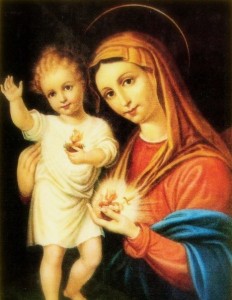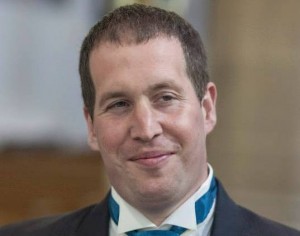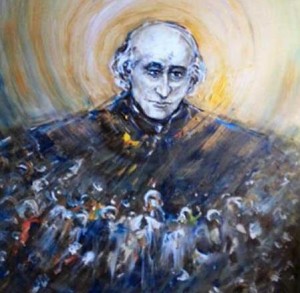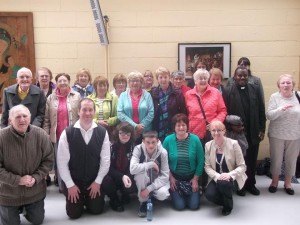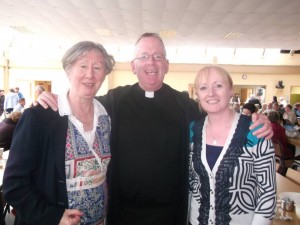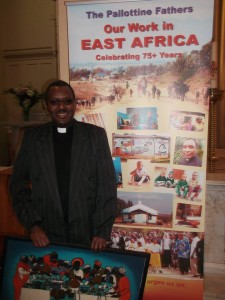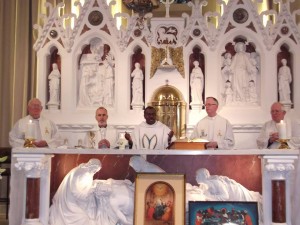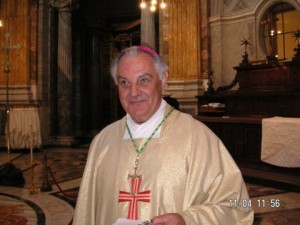- This is Our Life
The seed of religious and consecrated life is always germinating from the arable and nutritive divine landscape. Its beauty is never seen and vitality is never experienced without being connected into the mystery of the Trinity and the redemptive love as experienced and lived by the person. In the experience of the call and the living of the call itself, the gift of consecrated life is surfacing to nourish and share the joy of being graced by participating in the salvific mission of our heavenly Father and that of the church.
As consecrated life takes the image of Christ in the calling, in its formation and in mission; in it is a personal decision to walk the talk by leaving everything and fundamentally making one’s life ready to faithfully live the big Yes, the yes that says ‘here I am.’ Thus Lumen Gentium reminds us of the Yes of our baptism which is completed and perfected when we consecrate ourselves wholly to God in the totality of love.
The Christological and Pneumatological nature of the consecrated life invites the participant not only to follow and live Christ radically but also to open oneself to the workings of the power and the gifts of the Holy Spirit. The imitation and the special gaze on Christ’s face are to illumine our deepest selves so that we may joyfully radiate the presence of Christ to all and at all times. Our partnership of life of our very selves, with the gifts of the Spirit are for constantly being renewed and energized to live to the demands of our call and the mission ahead of us, as Vita Consecrata says, there is ‘going up the mountain and coming down the mountain.’
The joy of accepting the invitation of Christ has to be the joy that accompanies us in living our call and mission. When the year of consecrated life was announced, the message that is accompanying us to ponder and reflect is the reality of this joy. In whatever moment and situation, Pope Francis is inviting us to rediscover the deepest root of our calling in joy. Our lives individually and communally, in mission and apostolate are to continually radiate the presence of joy, to the extent that where there is a consecrated person, there is joy.
- It is in Us……Joy
Consecrated life is never a life of emptiness and in emptiness. As it has its foundation, its mission and gracious return in faithfulness and joy; in it are the consecrated men and women who heed to its demand and its call. There are different calls into it as important as the other, and this year, joy is our necessity and in deed our greatest demand. It is never a small matter because it holds certain other things that open up further understanding of our relationships and mission.
Since time in memorial joy has been fundamental to the existence of humanity and to its well being. It is a word and an experience that has been accompanying men and women of this world. When denied, life and its dimensions are denied. Life is turned upside down and becomes gloomy, dull, miserable, dysfunctional and dreary, depressing … etc. When freely lived and shared, joy brings delight, humor, content, friendship, love …etc.
The anthropological experience of man in his state of being and nothingness reveals his different capacities, both positive and negative. Not only can he transcend the state of life’s limits, he can also vision ways of living a better life. He operates in this through hope which is in him making the spirit of yearning and eagerness important factors. As joy could be minimized to the periphery of one’s life, it is the yearning for goodness within the capacity of our being that can once again revive and centralize joy in our lives. The tension between consistency and inconsistency in maintaining the state of goodness in joyful endeavor may be corrected and balanced by continually reviving our yearning, our goodness and understanding our limits for better complementarity. It is our faithfulness, our consciousness, it is our state of being in choosing what build our anthropological relationships than what leads to its collapse.
When saint Augustine says ‘my soul shall not rest until it rests in God,’ it reminds us of this spiritual and anthropological yearning which transcends us to the divine presence. We have been created for a great and valuable life. Hence when we open ourselves to the divine and higher values, we are exposing ourselves to that contact with our Creator who is the first source of our joy. We rise beyond human capacities and limits because we are no longer the ones but “the spirit comes to our aid” to help seek what is deep and fundamental to our spiritual corporality.
When we sing ‘give me joy in my heart keep me praising…’ we seek divine intervention and presence, we seek the perfection of what is ordinary for the greater well-being of the body and soul in union with God. Jesus speaking to his disciples before his departure in the gospel of John, insisted on joy being perfected, being fulfilled in them. As it is never fulfilled when it is too human, the invitation is to ground that joy in the continual loving relationship with God. At this point, this is how it opens itself; joy is love, joy is relationship and joy is connected to other dimensions of our call and life as Christ’s true followers. That is why in Paul joy is part of the fruits of the spirit (Galatians 5).
What is our call in this divine-man relationship? A life of deep and persistent joy elevated to the divine presence indicates that we live the life of the Spirit and have immersed ourselves in the Divine presence. In it and in the consecration of our life, we continue having a shining star, to guide and motivate, to instill in us a persistent walk of great moments of rejoicing. We become the manifestation of true liberation in spirit and a sign of gratitude to our different situations and circumstances in maturity, in true nature and true interaction. Our joyous present moments in spirit are not isolated from our future dream of encounter. Thus joy is eschatological when is enriched and graced with our hopes. It points to the future, the destiny of our faith and our commitment to its values. Its sacredness is in its goodness, its transforming power. Its sacred inspiration is its constant call to embrace the source of all joy, God himself.
- Experiences of Joy
Joy is a human experience with its own signs, symbols, gestures and moments in human terminologies. As is our reality of our everydayness, joy helps to us learn, remember and adapt. Joy makes us who we are, what we do, why and how we do it and to whom. Joy has its own intensity, force, power and strength when experienced and lived. And we have to agree that to rejoice, to be joyful is a decision, a choice. Look at St. Paul in 1 Cor 6:4-10 when he says “…we are treated…as punished and yet not killed, as sorrowful yet always rejoicing…” Job also in 19:25-26 sounds the same.
In the midst of troubles, problems, difficulties, mysteries, paradoxes, sickness, brokenness, fragility …what is my reason of acceptance and of rejoicing. What is the reason of the sick men and women who are in constant pain and tribulations (like Paul) but are never silent of their hopes and their joy? How many times have we seen our sick brothers and sisters portraying a stronger inner energy and a greater sense of acceptance compared with those who are strong and healthy?
What was the source of joy of the first missionaries, the joy of those who go to open new missions, the joy of those who take risky and challenging apostolate? How about the joy of consecrated men and women whose thoughts and energies are directed to places where things have not been easy, places where everyone else pulled out, but are determined to stay put and share their love and joy? How about those who from the first day of their consecration and apostolate placement have seen life in its periphery and is their joy to be where they are mostly needed?
As consecrated men and women, our choices on the state of our life and our being are crucial to the foundation and development of the person. If we responded to our divinely inspirational call of ‘rejoice, rejoice, and again I say rejoice…’ we would be walking on a greener path of the presence of life, joy and love. Not only would we encounter the shining light but we would radiate that presence. We would echo back the great sound of personal victory which speaks to our hearts and spirits invoking strength and determination no matter what. We are brought to that relationship with divine gifts, grace and strength. All these are to aid our human nature to discover true value in rejoicing.
A consecrated man and woman never define himself or herself without his or her fellow kaka (brother) and dada (sister). This is what defines us as people with communitarian character. We not onlyt live and stay together, but we journey, share and experience the dynamics of our life and apostolate together. It is pity for a newly consecrated kaka and dada to begin his/her responsibility in a non-joyous community or where personalities are never in communitarian spirit. The begging question is: have we prepared him/her for such a situation? Are we confident of his/her tools of interaction in that reality? Do we have to think twice before such a decision?
In all that we do and think as consecrated men and women how are we perceiving and expressing the sense of community life? As this is a place of ‘together we journey, together we rejoice,’ its fundamental details need to be revived and its spirit needs to be rekindled. It was never wrong in the African systems of thoughts and life when it was said ‘I am, therefore we are.’ And it is never wrong in our consecrated life to continue saying the same, and even more so in the words ‘I rejoice and therefore we rejoice’ and vice versa. Thus in this year of consecrated life, let it be the year that I question my role in building up a community. Lets question our status of communitarian character. Let’s question our fraternity, our love, our forgiveness, our support for each other to heal ourselves and heal our communities.
We need to carry in community living four things: love, forgiveness, joy and hope. Do they substitute each other? Is one better than the other? Our deepest ambition should be to bring them together in the bigger basket of consecrated life. It is this ambition and desire in us that will set a purposive direction; bringing to light what is valuable for each one of us. A life of self-giving love is what we are reminded about, a life of generosity, of service and of practicality as we commit to each other in following Christ, as I borrow these words of Saint John Paul II in Vita Consecrata. As consecrated persons in our communitarian life we are invited to love and care with the heart of Christ. It is the invitation to amend and heal with the compassion of Jesus, to welcome and to give hope. We are to joyfully celebrate our communion and companionship in the light of divine presence.
If communities of consecrated life are to embrace our Lord and the gracious presence of our heavenly mother Mary, will never be lacking love and joy. Our communities of consecrated life will never be a place of inner and silent death. We will never suffocate each other, exclude each other, eliminate each other, suppress each other or speaking evil to each other. As we embraced Jesus with the ‘Yes’ of consecrated life, we will embrace each other mercifully, lovingly and joyfully.
Let’s Question Ourselves Joyfully:
- Am I finding meaning in my consecrated life in the presence of God?
- As consecrated person, where am I searching for my joy? Is that a real joy in the consecrated life?
- In my involvement as an entrepreneur of joy in its divine and bigger picture, is my personal goal contributing to that of the other?
- Am I widening the circle of information on the beauty and goodness of joy, communicating it, coordinating it?
- Do we still have hopes and joy to continue working despite the challenges, resistances, failures …etc.?
Consecrated life is a precious and beautiful life in itself. It is a gift, a special divine gift. Our commitment to it is in loving our God and the mystery of our salvation in the life of the Trinity. In moments of Eucharistic celebrations, prayers of the church, meditations, our spiritual renewals in recollections and retreats, personal and community prayers, we are brought close to God and to each other. In them, together as consecrated persons, we walk on the road leading to joyful sanctification. Constantly we are to ponder God’s ways and God’s word to understand the dimensions of His great love for us, and vision our joyful response. The fragrance of our consecrated life is to perfume the individual person first, then spreads and perfumes my kaka and my dada and brings us closer to the source of its joy and its beauty which is God. In the beauty of its fragrance, together we rejoice and are glad.
“The joyful heart sees and reads the world with a sense of freedom and graciousness.”
John O’Donohue

